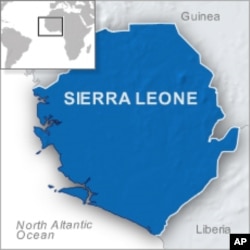Though renowned for its mineral resources, Sierra Leone also has significant unfarmed agricultural land and a large population of rural small-scale farmers. With a $400 million plan to turn small farmers into small businesses, the government hopes to improve the lives of 80,000 farming families and also improve food security.
It is harvest season, always a busy time for rice farmers here in the northern district of Koinadugu. But this year, there is more activity than usual.
Fifty women meet regularly in a rice field 24 kilometers outside of Kabala town. For three days in every week, the women spend their time harvesting, threshing and transporting rice. They eat, sleep and breathe rice.
Hawa Marah heads the small farmers' group. She has been farming all her life. But it is only recently that she has started farming rice to produce a surplus for sale.
Marah says, when she first started farming, she was just working to eat. They produced about five bags of rice, but before the year was over, the rice was finished. So they had to buy rice. But when she came together into a group, she says, they were able to produce a lot more. Now, she says, "we eat until we are full, and we sell the rice. So we get money and we get rice."
Up to two-thirds of Sierra Leone's 5.6 million people are farmers, and the large majority cultivate small plots of land, producing barely enough to feed their families.
Only 20 percent of a potential 5.3 million hectares of arable land is cultivated. Farming in Sierra Leone is largely a manual affair. Farmers use scythes to cut the tall rice stalks, and sticks to thresh the rice.
Under the government's plan, individual farmers are encouraged to form groups that can then benefit from business centers where they can process their produce and sell it. The government provides subsidized seeds, and supplies machinery, such as tractors and processing machines on a lease-to-buy plan.
Marah's group is one of 30 under the Koinadugu Women Vegetable Farmers' Cooperative, an umbrella group that boasts 750 members, and continues to grow. Last year, the cooperative sold 30 metric tons to the United Nations' World Food Program. This season, they hope to produce over 50.
With the help of the USAID-funded project, Promoting Agriculture, Governance and the Environment, known by its acronym PAGE, the women's farming cooperative has learned new farming techniques that boost productivity.
And a $10,000 grant from the USAID project has enabled the women to purchase a milling machine and processing equipment, which means more rice of a higher quality.
But challenges remain.
Mouris Kallon is PAGE Coordinator in Kabala. He says farmers can produce more, but the cost of labor and transportation is still prohibitive.
"It is only now that farmers are starting to go into mechanization. Most of their work is done manually," said Kallon. "So, to expand on production requires a lot of manpower. So, as the cost of labor in Sierra Leone right now is very, very high, labor cost is one major challenge that the farmer groups are facing out there in the field. Another challenge actually is that of transportation. The road networks are really very bad. Sometimes, in the rains, the vehicles cannot ply the routes to the farm sites."
The women farmers' walk two kilometers to their farm, over rickety log bridges and through swamps. The only way to get their rice to market is to carry it on their heads.
Rice is Sierra Leone's much-loved staple food. But the country currently relies on imports from South-East Asia for a third of the rice it consumes, making poor families vulnerable to food price shocks.
When food prices shot up in October 2008, the poorest families in Sierra Leone were unable to afford rice, and thousands were pushed further into poverty.
The Koinadugu women farmers are determined to change this. "Educate the Children and Feed the Nation" is their motto.
Hawa Marah smiles, showing the glint of a gold tooth. For her, the farming business has changed her life, bringing in a steady income and respect from her peers. She says many women come to her now wanting to join the group, and even her teenage daughter wants to go into the family business.




